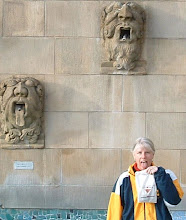A little housekeeping duty to catch us up: define the meaning of identity and discourses.
Within this blog the term identity is defined as who a person is from the mixture of the basic personality traits one has when born along with how they are shaped by life experiences as well as within the variety of discourses we inhabit.
Discourses is used to mean any group, whether one person or a multiple, of which we are a part, whether chosen (for example being a graduate student, or if you decide to marry, you become a spouse or if you decide to not marry you may be single or have a partner) or not chosen (a child - usually - has no choice as to the family they live with or you cannot vote in the US if you are under 18). I believe that within different discourses individuals tend to not only show different aspects of their personality, but for some they will speak differently or even act differently. How a person interacts with their parental unit (mother, father, guardian) is normally different than with their lover and may, depending on age and interests, be yet again different with friends, co-workers, teachers, you get the picture.
For a more in depth discussion of discourses as used to inform identity in both language usage and social usage, see Michele Knobel's 1994 book Everyday Literacies published by Peter Lang (see chapter 2) . Michele has a blog with Colin Lankshear called
everydayliteracies.
No comments:
Post a Comment